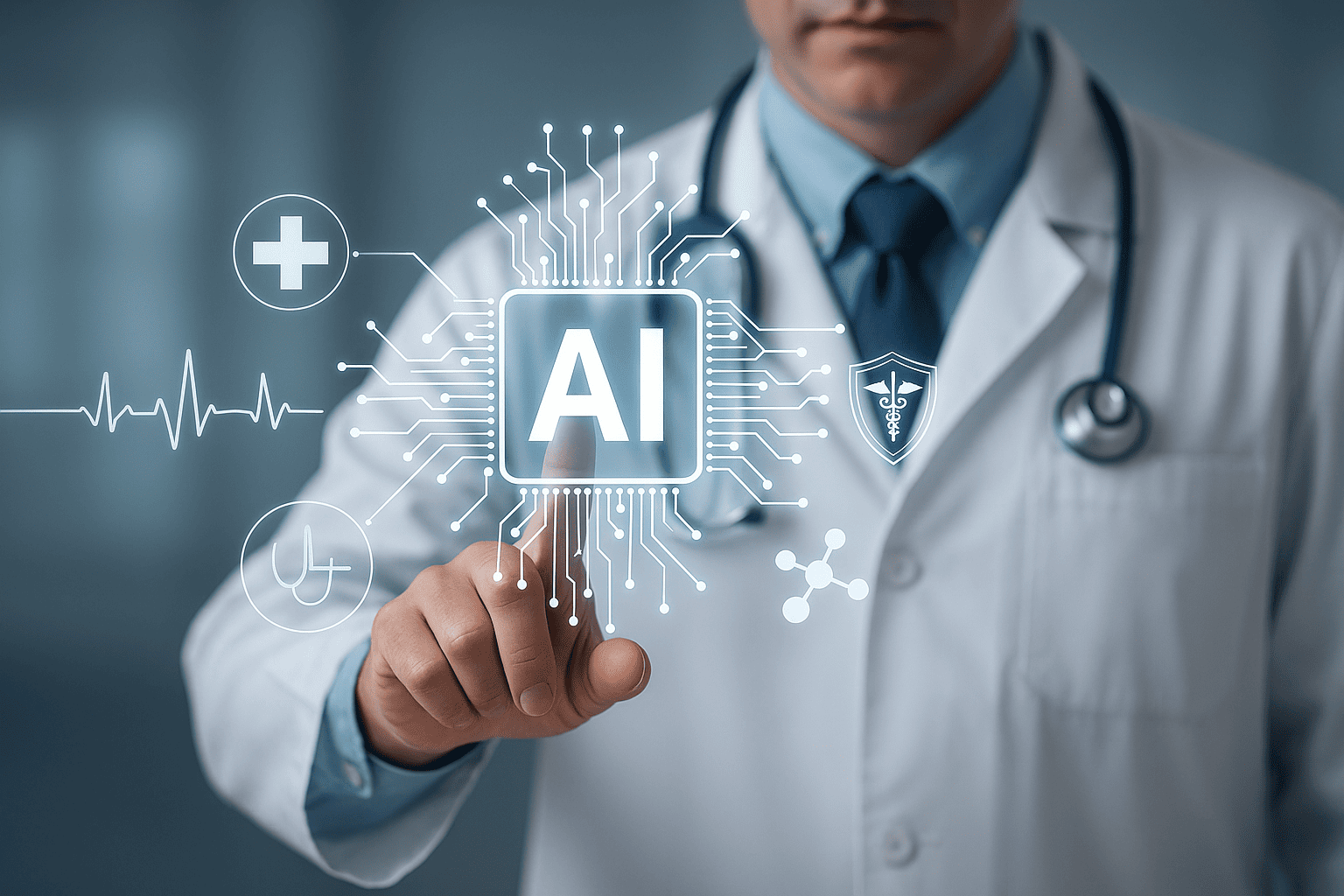Updated on: July 8, 2025
Artificial Intelligence (AI) is no longer a futuristic concept—it’s already here, reshaping every corner of the healthcare industry. From improving diagnostic accuracy to streamlining clinical documentation with Virtual Medical Scribes, AI in healthcare is driving better patient outcomes, reducing burnout, and saving costs.
But how exactly is AI transforming healthcare today? And where is it headed?
In this comprehensive guide, we explore the impact of AI in healthcare, real-world applications, key benefits, and practical ways clinicians can start using AI—including AI-powered medical scribe solutions like Docscrib.
What is AI in Healthcare?
Artificial Intelligence in healthcare refers to the use of advanced machine learning algorithms, natural language processing (NLP), and data analytics to:
-
Automate repetitive tasks
-
Analyze complex medical data
-
Assist in decision-making
-
Enhance patient care
AI doesn’t replace clinicians—it augments their capabilities, enabling faster, more accurate, and more efficient healthcare delivery.
Key Applications of AI in Healthcare
1. AI for Clinical Documentation (Virtual Medical Scribes)
One of the most practical and immediate uses of AI is in automating medical documentation through Virtual Medical Scribes like Docscrib.
These AI-powered tools:
-
Capture physician-patient conversations in real time
-
Automatically generate SOAP notes
-
Seamlessly integrate with Electronic Health Records (EHRs)
👉 Result: Less time on paperwork, more time for patient care.
2. AI in Diagnostics and Imaging
AI algorithms can detect anomalies in:
-
Radiology (X-rays, CT scans, MRIs)
-
Pathology slides
-
Dermatology images
These tools help speed up diagnosis and reduce human error, especially in high-volume specialties.
3. AI-Powered Predictive Analytics
Hospitals are leveraging AI to:
-
Predict patient readmission risks
-
Identify potential complications early
-
Personalize treatment plans
AI helps move healthcare from reactive to proactive care.
4. Virtual Health Assistants & Chatbots
AI-driven chatbots assist in:
-
Appointment scheduling
-
Patient triage
-
Medication reminders
These solutions improve patient engagement while reducing the workload on staff.
5. Drug Discovery & Clinical Trials
AI accelerates:
-
Drug discovery processes
-
Clinical trial design
-
Personalized medicine development
This reduces time-to-market for life-saving therapies.
Benefits of AI in Healthcare
| Benefit | Impact on Healthcare Practice |
|---|---|
| ⏱ Time Savings | Less time spent on administrative work |
| 📈 Increased Accuracy | Fewer diagnostic errors and better notes |
| 😊 Reduced Physician Burnout | Less “pajama time” and more patient focus |
| 💰 Cost Savings | Automating tasks reduces overhead |
| 🧑⚕️ Better Patient Outcomes | Early detection, personalized care plans |
AI in Healthcare: The Role of Virtual Medical Scribes
Clinical documentation is one of the biggest sources of stress for physicians. Studies show that doctors spend up to 50% of their day on EHRs and administrative tasks—time that could be better spent on patient care.
That’s where Virtual Medical Scribes like Docscrib come in.
How Does Docscrib Help?
-
Records patient encounters in real time
-
Generates accurate, structured clinical notes
-
Reduces after-hours charting and burnout
👉 Start saving time with AI-powered scribing:
Book a Free Demo
Potential Challenges of AI in Healthcare
While the benefits are immense, AI adoption in healthcare does come with challenges:
| Challenge | How to Mitigate |
|---|---|
| Data Privacy & HIPAA Compliance | Use secure, compliant platforms like Docscrib |
| Algorithm Bias | Regular audits and diverse training data |
| Technology Acceptance by Clinicians | Training and clear communication |
| Integration with EHRs | Opt for solutions with easy integration like Docscrib |
Future Trends: Where is AI in Healthcare Heading?
-
Generative AI for Personalized Care Plans
-
AI-Assisted Surgery
-
Voice-activated EHR navigation
-
Predictive Population Health Management
AI will continue to redefine clinical workflows, enabling more human-centered care powered by smart automation.
How Can You Get Started with AI in Healthcare?
-
Identify pain points: Is documentation burnout, diagnostic backlog, or patient engagement an issue?
-
Start small: Consider AI solutions with immediate ROI, like Virtual Medical Scribes.
-
Choose the right partner: Solutions like Docscrib offer scalable, compliant, and easy-to-integrate tools.
-
Train your team: Early adoption works best when staff are comfortable and informed.
Final Thoughts: The Time for AI in Healthcare is Now
AI is no longer a luxury—it’s becoming a necessity for sustainable, high-quality healthcare. From Virtual Medical Scribes to advanced diagnostic tools, AI in healthcare is empowering clinicians, reducing stress, and improving patient outcomes.
✅ If you’re ready to take the first step with AI, start with Docscrib—a simple, effective way to:
-
Cut down on charting time
-
Improve documentation quality
-
Boost your work-life balance
